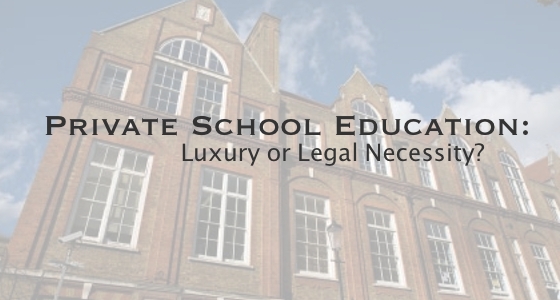
Clients of Cordell & Cordell often ask their divorce lawyer if they can be legally forced to pay the costs of sending their children to private school.
Usually it’s the ex-wife insisting on private school education at the cost of the father, who argues that a public school is just as good a fit for their children as a private institution.
Case law sheds significant light on this issue in providing that only under certain conditions and circumstances can a court force a party to pay for private schooling on behalf of the minor child.
Case Law
For instance, in Drury v. Racer, 17 S.W.3d 608 (Mo. App. E.D. 2000), the court reviewed whether the trial court erred in increasing father’s child support obligation to include costs of parochial school. The court provided that “a child’s educational need is a relevant factor that the trial court may consider in awarding child support.” Id. (quoting In re Marriage Glueck, 913 S.W.2d 951, 955 (Mo. App. 1996)).
Moreover, “the decision to increase child support that requires noncustodial parent to pay a portion of private school tuition rests within the sound discretion of the trial court.” The fact that a parent does not agree to send a child to private school or does not want to pay for it is not by itself sufficient to deny child support for educational expenses. Id. (quoting Shiflett v. Shiflett, 954 S.W.2d 498, 494 (MO. App. 1997)).
However, a parent’s lack of willingness to pay for the same is a relevant favor for purposes of the court’s analysis. Shiflett 954 S.W.2d at 495. Accordingly, the “test for determining whether a court should order private schooling over the wishes of one parent is when such schooling will meet the ‘particular educational needs’ of the child.” Id.
Upon application of the above, the Drury court found that the mother failed to prove that private schooling met any particular education need of her children. Specifically, her child had no special educational needs and was found to be able to do well at any school.
Moreover, the local schools were admitted by the mother to be “fine schools” and as such, not educationally inferior to the parochial school. As a result, the trial court erred in ordering father to pay one half of the parochial school expenses.
Otherwise stated, “in order to compel payment from father, mother must prove the parochial school meets the particular educational needs of the child.” This, according to the court, mother had failed to do.
Case Example #2
Similarly, in Shepard v. Shepard, 47 S.W.3d 412 (Mo. App. S. D. 2001), the wife maintained that the trial court erred in the amount of child support it ordered because the husband failed to include private school for the parties’ daughter.
At trial, the wife testified that the child had always attended a private school and that “all of her friends are there.” The father countered by asserting that he did not feel that it was in his daughter’s best interest to continue at a private school because she needed to be more rounded.
In its final judgment, the trial court noted that the child did not have any special educational needs that could not be met at the local public school and also, that being traumatized by having to leave a school is simply not enough to force father to pay significant private school costs.
Consequently, the court did not increase the basic amount of child support for private school expenses, noting that it has “the discretion to include a portion of private school tuition in child support paid by a non-custodial parent.”
The court looked at numerous factors in rendering its decision, including the fact that the cost of the private school per year, which was in excess of $6,000, was hard for husband to afford in light of his $2,684 per month gross income.
The court noted that “the cost of education is a proper factor to consider, and including costs for private education is conditional upon such education being within the financial means of the person or persons providing support.” Id. (quoting Marriage of Manning, 871 S.W.2d 108, 111 (Mo. App. 1994)).
Hence, the court concluded that the trial court did not err in refusing to include the cost of private schooling in husband’s child support payments.
Private School Benefits
 Notwithstanding the Shepard and Drury rulings, the court in Garner v. Garner, 973 S.W.2d 513, 15 (Mo. App. 1998) ruled in favor of the parties’ children attending a single-sex private school.
Notwithstanding the Shepard and Drury rulings, the court in Garner v. Garner, 973 S.W.2d 513, 15 (Mo. App. 1998) ruled in favor of the parties’ children attending a single-sex private school.
Specifically, the father contended that the trial court erred in including the cost of the private high school on child support Form 14 because the mother had insufficient evidence to show that this was a necessary expense. Id.
However, the mother testified that she had selected the private education for the children given that they would benefit academically from the structured atmosphere with fewer distractions associated with a single-sex private school.
The mother also asserted that she anticipated that by enrolling the children in this school and its corresponding athletic program, the children’s future opportunities would increase. The mother further testified that the younger child would benefit emotionally from attending the same private school as the older child.
Moreover, the mother also wanted her children to attend private school in order to increase the children’s chances of receiving scholarships for their post-secondary education due to its specialized athletic program.
Since there was sufficient evidence demonstrating the benefits of private education meeting the children’s particular educational needs and as to athletic activities enhancing their well being, the court ruled that the father must financially contribute towards the costs of the children’s private school. See also, Leslie v. Leslie, 948 S. W.2d 458 *Mo. App. 1997) (The court accepted evidence that the local public school environment was particularly hostile, lacked air conditioning, and was shown to aggravate children’s asthma).
Conclusion
Overall, it is important to keep in mind that for the court to force you to pay for your children’s private school depends upon a lot of factors, including but not limited to, your income, your children’s specific needs, whether you agreed to a private school arrangement when you were divorced, etc.
Accordingly, it is important to speak with a men’s divorce attorney who can further advise you as to what your potential obligations are in this regard, especially when being asked to cover private school expenses.
While the above decisions demonstrate a spectrum of situations that may arise in this regard, keep in mind that each case is unique and as such, there are no guarantees as to a specific outcome in your case.



My father is class in narcissist allllll the way . He used a jeep to sway my adopted child away from me made up a bunch of lies about me had me reported to dss. Dss found no need to further investigate. I try so hard with my kids for my father to buy my son a 40 k jeep against my wishes have him run away and take him in saying f yout father who cares then switching him to another school without me knowing enraged me . I have custody of this child I adopted him in 2007. I’m so frustrated. The same father I talk about has done so much rotten stuff to me including steal millions in inheritance is just depressing. And not because I give two squats about the money. I really love my father and my son and now the 3 of us will never be close again. never
Court has forced me to pay 33% of my sons high school tuition. I am in debt and have no credit or money to pay it and child support. What can happen if I don’t pay it? New Jersey